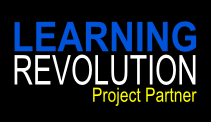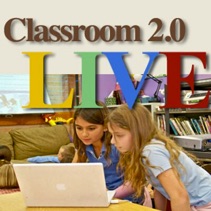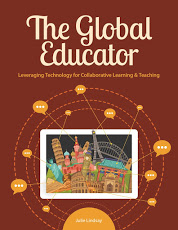Professor Stephen Heppell St Katherine Docks, Tower of London, England
Blog Stephen’s Phone Blog http://phone.heppell.mobi
Twitter: @stephenheppell
Bio CEO Heppell.net,
Professor Bournemouth University, Chair in New Media Environments,
Emeritus Professor Anglia Ruskin University: Chair in New Learning Environments,
Visiting Professor University of Wales, Newport.
Executive chairman LP+
Chair of Trustees: The Inclusion Trust
“Europe’s leading online education expert” Microsoft 2006
“the most influential academic of recent years in the field of technology and education” Department for Education and Skills (DfES), UK, 2006
Bio Page http://rubble.heppell.net/heppell/quiickbiog.html
Presentation Title “It Simply Isn’t the 20th Century Any More Is It?: So Why Would We Teach as Though It Was?”
Description: We are in the throes of a financial crisis unparalleled on our lifetimes, and at the same time in front running 21st century schools around the world learning is seeing a transformation that seemed unthinkable in the dark days of 20th century factory schools.
As we move to a new tomorrow built on mutuality, collegiality, communication, community and ingenuity can we learn anything from the colossally expensive financial collapse of Wall Street, the City of London and many of the world’s financial centres.
In three sections, and in a conversational, intimate style, Stephen examines the certainties that stare us in the face from past learning projects that clearly mapped a new world of 21st century learning; he reflects on the impact on technology on the world around us, including the financial world, and ponders on what this means for education, for learning, and for the necessary pace of change as we experience the death of education and the dawn of learning.
Link on dotsub
About transcribing/translating this video
Download
Original QuickTime Version (39:20 Run Time; mov, 78.3 MB)
iPod ready Video (39:20 Run Time; mp4, XXMB) coming soon
Audio only (39:20 Run Time; mp3, 23.9 MB)
Supporting Links
http://www.heppell.net/
Essential Questions
[tags]k12online08pc, k12online08[/tags]








Pingback: K12 Online Conference: Amplifying Possibilities - Kent ICT Blog
Love the title of this keynote – sums up what current thinking around education should be all about!
Pingback: » K12 Online Conference 2008 Distributed Learning Family Blog
Great start to k12 2008, just so much common sense.
Wow–lots of good thoughts here. I’ll definitely be reviewing the video and making more notes. Isn’t that great about this kind of delivery? I can attend a session as many times as I want/need to.
I really liked the analogies he made to the worldwide economic meltdown and how that relates to education. It’s true that traditional schools will compete for students.
My favorite line of all was at the end when he said this is the death of education and the dawn of learning. WOW! What a glorious dawn it is.
I have to admit, I was a little nervous when I saw that David Warlick was not presenting this year’s keynote. I guess I thought it was a tradition or mandatory somehow that he kick this thing off. I was so pleased with the presentation by Stephen Heppell. I really hope I can attend the fireside chat with him.
Thanks to all who organized another fantastic conference. I can’t wait to experience the rest!
Pingback: K-12 Online Conference « The View From My Window
I know that my mother, a long-time teacher has always touted the superiority of the New Zealand educational system since the advent of the work of Marie Clay.
Pingback: 3, 2, 1…K12 Online Underway | Whip Blog
Pingback: Death of Education, Dawn of Learning « Tools of Engagement
Pingback: Join the K12 Online Conference - It’s free! « California Dreamin’ by Rob Darrow
Pingback: K12 Online Conference « Virtual High School Meanderings
Pingback: Stephen Heppell chats interestingly. « Alan Stewart’s Blog
I loved this keynote. Found so much of it interesting and exciting. I think my favorite “statement” was something to the effect of:
“Teachers are not supposed to provide learning, they need to provoke it”.
He understood that teachers are NECESSARY, you really can’t expect to get too much learning going on with a room full of kids and a few computers. But, the role of the educator NEEDS to be to provoke the learning, not provide it!
I LOVE THAT.
Here are a couple of highlights I thought were especially powerful:
* Now that technology can “do jolly well what we want,” the challenge is not ‘what can we make the technology do?’ The challenge is ‘what do we want?’
* He asserts that education as we know it—the factory model and the emphasis on productivity over community—needs to be completely replaced or schools will disintegrate. He says the signs are there and points to the indicators that preceded both the current financial crisis and the current trends in online learning.
* He called attention to the big, BIG picture context of new technology and media: We are seeing fundamental change, which he says can be described as the end of oligarchy or, more simply, as the end of “they” and the beginning of “us.” He linked this to the dominant paradigms of prehistory and more “primitive” civilizations, which were/are “not locked in a world of narrative linearity and ownership of knowledge.”
* He says we are witnessing “the death of education and the birth of learning.”
As someone who spent much of the 90s writing about technological revolution, I was thinking about how that revolution was just the tip of the iceberg. So much attention was focused on that while all the structures of our society and how we think were being reconfigured.
I began to think about the ideas of the scientist Ilya Prigogine who many may remember was cited in Margaret J. Wheatley’s Leadership and the New Science: Learning About Organization from an Orderly Universe (1992, Berrett-Koehler). I pulled out my copy and read that while it makes sense to stabilize machines and structures as a way to prevent deterioration, living systems (organizations) need non-equilibrium to change and grow because they exchange energy with their environments. Prigogine said living systems are “dissipative structures.” In Wheatley’s words, they “dissipate their energy in order to recreate themselves into new forms of organizations” (88).
In ecosystems, for example, external fluctuations in the environment exert great pressure on the system and the system uses its energy very inefficiently, but “as the ecosystem matures, it develops an internal stability, a resiliency to the environment that, in turn, creates conditions that support more efficient use of energy and protection from environmental demands”(92).
Wheatley applies these ideas to organizations. In the factory model, she says, “managers watched for departures from the norm so they could “make corrections and preserve the system at its current levels of activity”(78). Systems that are organized around core competencies but open to information from outside are less vulnerable to environmental disturbances. Their more fluid structure ultimately leads to an internal stability. As expressed by one scientist she quotes (Jantsch), “the more freedom in self-organization, the more order.”
On other words, there is much more happening in education than a change in tools. Trying to impose the old factory model using new tools will not work. Openness, creativity and freedom to innovate are the system of learning that is being born as the old system of education dies.
Totally Agreed! “Technology can do ANYTHING we want.”
Pingback: Cells and Bells « Fusion Finds
A very wise keynote address by Professor Heppell. I am so glad it was recorded for later viewing, and reviewing, for those of us eating turkey on October 13 or otherwise engaged. It takes great wisdom to be able to make the “death of education” the “beginning of learning” and to do so in such an enthusiastic, optimistic and encouraging fashion. I do hope he got out sailing!
I really enjoyed your conclusion in which you stated that we are seeing a “death of education and a dawn of learning.”
Pingback: K12 Online Conference 2008 has started | Edubeacon
arvind grover, Vinnie Vrotny, and did our weekly webcast at EdTechTalk on the keynote. Check it out here: http://edtechtalk.com/21cl_80
Thanks.
Pingback: Who was Ray Martin? «
So many relevant ideas. I particularly found the idea of “the death of They and the beginning of Us” fascinating. In this age individuals have more power by being able to access knowledge freely at any time and thus make their own decisions. Also importantly is the social communication and collaboration that globally can create communities of interest that can rival a corporation. Yet an individual may have multiple identities based on the community of the moment.
I agree it is the beginning of “Us” but perhaps even “Us/Me” needs to redefined.
re post by Shaun Wood – That is a very good and loaded point!!!! However, it is getting harder for us/me discrepancy people to hide on the web these days no??? In a sense we are all as anonymous as our IP addresses…
Gail you are absolutely correct we are as anonymous as we wish to be. What I have found is that we create multiple identities, each based on the community we are interacting with, even ‘anonymous’ is an identity. I have my real life identity then I a professional educator identity which I work at establishing in relevant online communities. I also have a social network identity which again very different.
What concerns me is how we are preparing students in understanding and utilising these identities responsibly and effectively.
Pingback: Provoking NOT Providing Learning | Digital Tech-knowlogy
Pingback: “It Simply Isn’t the 20th Century Any More Is It?: So Why Would We Teach as Though It Was?” | Sliced Bread
Pingback: K12 Online Conference Starts Today | Multi-faceted Refractions
A lot of emphasis on community. Our technology allows us to keep connected and share. It is up to us to embrace it and remember we as teachers are the “provokers of learning.” By being there as part of the community we have a better opportunity to “provoke.”
K-12 Online Conference 2008 pre conference key note by Professor Stephen Heppell.
Technology can be anything we want it to be and we can be an invisible as we want to be.
I feel technology can be part of making learning better and worse depending on the use of it and the structure within the learning environment. We all realize how technology has changed over just the past 20 years and it is truly as life skill today, you cannot escape it but beware you can escape becoming totally entrapped in a world that is not real. I feel its important to teach our students the dangers of technology and the time stealer it can be as well as how to effectively use it to better our lives.
I can relate to the changes in the world of a textile community, as our textile industry has slowly disappeared. Education is pushed to change to meet the needs of our students and our individual communities. The speaker’s reflections on the changes that have happened in England were thought-provoking to people all over the world as other people see their communities changing. Educators must step up to accept the challenge of teaching in a world filled with technologh.
Pingback: K12 Online Conference - Session 1 | Mr. Bass
Pingback: k12 conferences 1st presentation « Jocelynskogberg’s Weblog
Pingback: Human » Blog Archive » Gazump
Pingback: Assignment G | SJS Teacher
Pingback: Assignment J | SJS Teacher
Pingback: Thing 13 | 2.0 Here We Go
Pingback: Why Bored of Studies PWNs the BOS «
Pingback: School-In My PJs…Yes! (Thing 13) | Cache22
Pingback: K12 Online Conference: Don’t miss it! « NeverEndingSearch
Pingback: Thing13: Exploring the International Jungle | My Journey Through the Jungle of Technology
Pingback: Death of Education, Dawn of Learning | Jeannine St. Amand